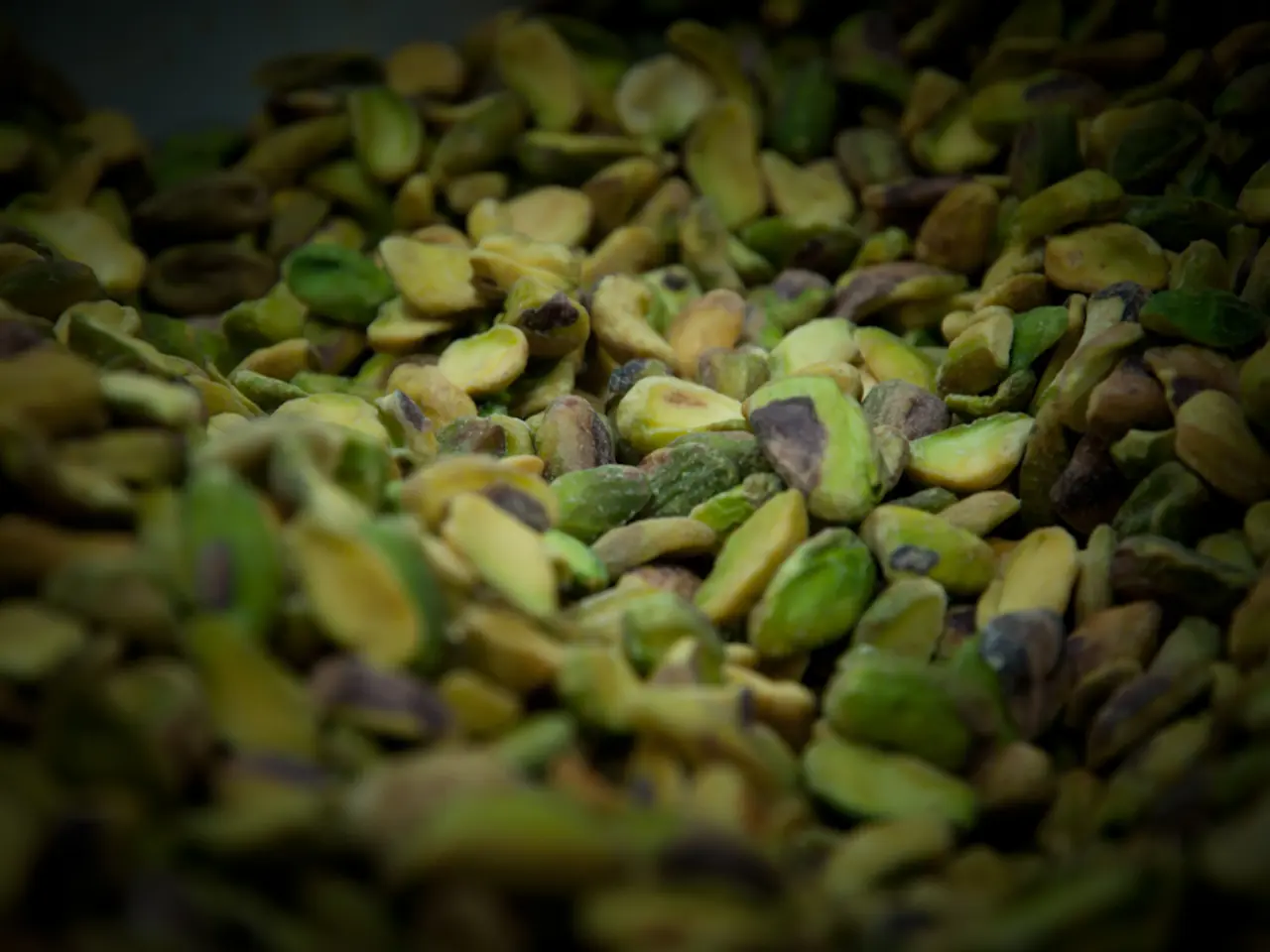Lowering Cholesterol with Optimal Nuts: Exploration into Nutrition and Studies
Lower Your Cholesterol Levels with Nuts: A Guide
A balanced diet plays a crucial role in maintaining good health, and incorporating certain nuts into your daily meals can significantly improve your cholesterol levels. Here's a breakdown of how various nuts can impact your cholesterol levels.
Hazelnuts
Hazelnuts are a rich source of healthy fats, dietary fiber, and essential nutrients. With 0mg of cholesterol per 100 grams, hazelnuts are a cholesterol-free food. The high dietary fiber content in hazelnuts is thought to contribute to lowering LDL cholesterol levels.
Cashew Nuts
Cashew nuts have shown mixed results in their effect on cholesterol levels. While some studies indicate they can lower total and LDL cholesterol, others find no significant effect. It's recommended to consume cashews in moderation as part of a balanced diet.
Walnuts and Almonds
Walnuts and almonds have the most significant effect on lowering LDL cholesterol and raising HDL cholesterol levels. Walnuts are particularly effective due to their combination of monounsaturated and polyunsaturated fats, high antioxidant content, omega-3 fatty acids, and dietary fiber. Almonds also contribute to cholesterol management because of their fiber content, healthy unsaturated fats, and plant sterols that block cholesterol absorption.
Recommended Daily Intake
- Walnuts: Studies suggest consuming about 1 to 2 ounces (roughly 28 to 56 grams) daily can improve lipid profiles, including raising HDL and lowering LDL cholesterol. Soaked walnuts may enhance digestibility and nutrient absorption, further helping cholesterol levels.
- Almonds: Approximately 1.5 ounces (about 42 grams or a small handful) daily is recommended to significantly lower total and LDL cholesterol.
These intakes are consistent with a heart-healthy diet and should be part of a broader lifestyle including balanced nutrition and physical activity.
Other Nuts
- Peanuts: Rich in phytosterols, peanuts can lower a person's total and LDL cholesterol levels without significantly affecting HDL cholesterol levels.
- Pistachios: Lower LDL cholesterol levels and increase HDL cholesterol levels.
- Pecans: A high pecan diet may lower LDL cholesterol levels, but further research is necessary.
- Macadamia Nuts: A small study indicated that macadamia nut consumption could lower LDL levels by around 12.9% while increasing HDL levels by 7.9% among men with elevated cholesterol levels.
- Brazil Nuts: A single serving of Brazil nuts can lower LDL cholesterol levels and raise HDL cholesterol levels after 9 hours in 10 healthy study participants.
Summary
Incorporating nuts such as walnuts, almonds, hazelnuts, peanuts, pistachios, pecans, macadamia nuts, and Brazil nuts into your diet can help manage cholesterol levels and support heart health. It's essential to consume these nuts in moderation as part of a balanced diet to reap the benefits.
[1] https://www.ncbi.nlm.nih.gov/pmc/articles/PMC6013997/ [2] https://www.ncbi.nlm.nih.gov/pubmed/20840057 [3] https://www.ncbi.nlm.nih.gov/pubmed/22283927 [4] https://www.ncbi.nlm.nih.gov/pubmed/22378080 [5] https://www.ncbi.nlm.nih.gov/pmc/articles/PMC6085040/
- Maintaining a healthy lifestyle with balanced nutrition, fitness-and-exercise, and health-and-wellness practices could help predict lower risks of atopic dermatitis and other related conditions.
- consuming essential vitamins like vitamin A, D, E, and C from food sources can improve overall health and potentially reduce the risk of ulcerative colitis.
- In a predictive study, a higher intake of vitamins was found to decrease the incidence of COPD, highlighting the importance of a balanced diet rich in vitamins for respiratory health.
- Obesity and diabetes are interconnected conditions that can be alleviated through improvements in diet and physical activity, focusing on nutrient-dense foods and regular exercise.
- Some research suggests that calcium supplements may help prevent kidney stones and promote healthy bones, but always consult a healthcare professional before taking any supplements to ensure safety.
- A balanced diet should include a variety of foods, including nuts, fruits, vegetables, whole grains, lean proteins, and healthy fats, to promote optimal nutrition and well-being.
- Science continues to investigate the potential benefits of hepatitis B vaccination during pregnancy to protect both the mother and newborn from the disease, further emphasizing the importance of vaccinations in preventive healthcare.
- Individuals with a history of stomach ulcers should be mindful of their consumption of acidic foods, spicy foods, and foods high in fat or sugars, as these can potentially exacerbate the condition.
- Nutrition plays a crucial role in managing various health conditions, including diabetes, obesity, and inflammatory bowel diseases like colitis.
- Supplementing one's diet with probiotics can help support gut health, potentially reducing the risk of developing skin conditions such as atopic dermatitis.




